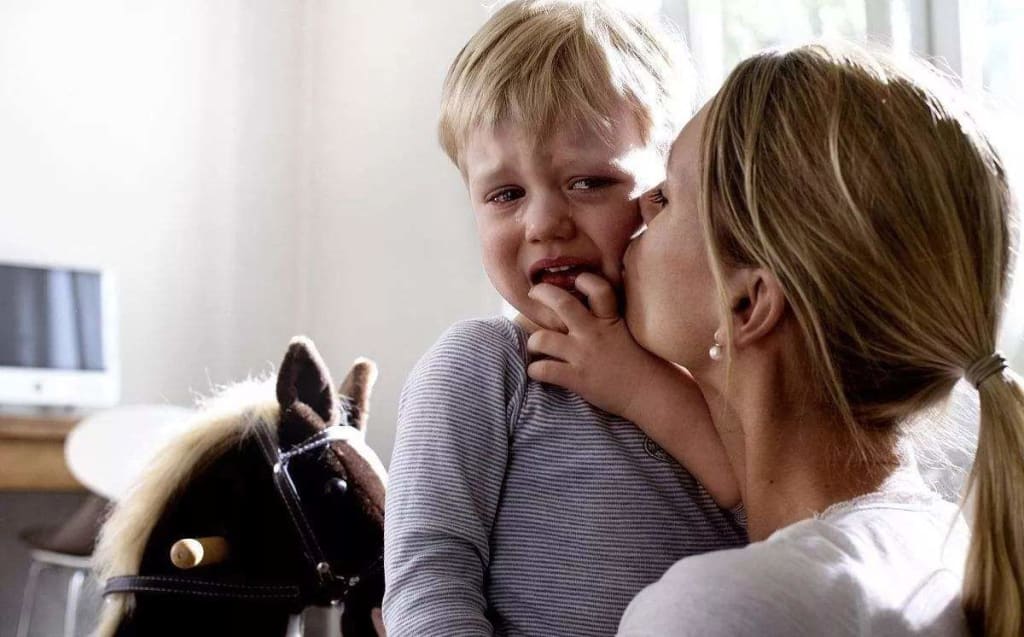
Children have a winning heart, win and laugh, lose and cry

Winning heart is a double-edged sword, can make the child motivated, but the winning heart is too strong, but also easy to "can not afford to lose", a failure to fall into a depressed, depressed mood, so Bi Swansong once said: "Parents should not only teach their children how to win but also to teach them how to lose beautifully. "
So, how do guide children to properly face defeat, can we "lose" it? You can try these 6 methods.
1. Allow the child who lost to cry
Although children face failure to express themselves the wrong way, the child has lost a very difficult, if then the parents said forcefully: "lost, lost, what's the big deal, no crying! This will make the child feel that their emotions are not understood and more anxious.
At this point, parents can use empathy to calm the child, guide the child to say they're true feelings, and tell the child: "Mom and Dad know you are not unreasonable, you are now very difficult, want to cry on it, nothing to be ashamed of."
Often, at this time, many children will not cry but will be amused by the parent's words, and soon forget the negative emotions.
2. Timely and positive guidance
When a child forgets a bad emotion, it is not the same as forgetting about it, and parents should do positive guidance promptly.
Children pay too much attention to winning and losing, often because parents are overly concerned about the results, exaggerating the impact of the results. For example, parents keep praising the first-place child, and say to the lagging child: "Look how good they are, you need to learn more from others." The child will be uncomfortable and will try to get the attention of others around him or her by "having to win" the next time.
Therefore, the best way to make your child "afford to lose" is to reduce the influence of the outcome and emphasize your child's good performance in the process. For example, at this time you can say: "Although you just ran behind, mom noticed that you have not given up, but try to catch up, mom is especially proud of you."
Let the child understand what experience or feelings gained in the process are more important than the final result, so that the child will not put all the attention on the result when doing anything in the future, but focus more on the fun of the experience.
3. Analyze the reasons for failure and help children improve their abilities
After doing emotional guidance, parents can take their children to do a review, analyze the reasons for failure and summarize the experience.
If it is a skill or knowledge competition failed, you can lead your child to analyze which specific area of ability or knowledge points were not mastered, help your child to develop brand new goals and plans, and strive to improve their abilities.
This will not only allow your child to quickly pull out of his or her low mood, but also to properly view his or her problems and gain an improvement in ability.
Note that if the child is still in a bad mood at that time, you can wait until the child's mood has calmed down, or do a review the next day because doing a review requires recall and may bring the child into a meltdown situation again.
In addition to doing these three steps, in everyday life, parents should also pay attention to these three points.
1. parents themselves should learn to admit defeat
Not only children, but parents will also have times of failure in their daily lives, which is a good opportunity to model and guide their children.
For example, the company held a badminton tournament, but the father did not get first, then you can teach the child by example: "Although not getting the first place some regret, Dad learned several new moves with the masters in the process of the game, and get exercise, Dad felt very happy. Dad feels that with more practice, he will achieve better results next time."
Share your own failure experience with your child, and the solution, your child will empathize, do positive attribution and think about failure, and will have a good mindset when encountering setbacks in the future.
2. Let your child experience failure and suffer some frustration
Sometimes when a child loses, he or she will make a fuss, and parents will immediately accommodate the child and let him or her win on purpose. This is a good idea, but it will make the child more and more competitive and counterproductive.
Constantly protecting your child's glass heart and not allowing them to face defeat will do them no good. The next time they fail, the child will feel shame and even have difficulty accepting it.
So, let your child experience failure more often and suffer setbacks to cultivate an open mind and face failure positively.
3. Humor to resolve embarrassment, divert the child's attention
Sometimes children feel humiliated, so they "can't afford to lose". This is the time to use humor to resolve the embarrassment and to help the child to divert attention more effectively.
For example, if the child did not do well on a math test, feeling lost, parents can say: "It does not matter if you do not do well once, we are not robots, robots because there are programs in the brain to not be wrong, do you also have a small program in your little brain? Let mommy see!"
The humorous way can make children laugh and forget the sadness of "losing".
There is no winning or losing in life, but once you have a winning or losing attitude, you are a loser."
As parents, it is important to cultivate children's "selfishness" of "love to fight to win", and it is even more important to cultivate children's temperament of "being able to win and lose". Only children who can afford to lose will win beautifully in the future.
About the Creator
Sal Tori
Education is what remains after one has forgotten everything one has learned in school.






Comments
There are no comments for this story
Be the first to respond and start the conversation.